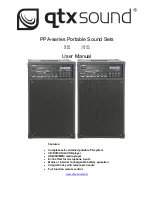
Deployment Guide – DOC. 7693K
AirMedia Presentation Gateway
•
19
•
File Association: The AirMedia client application is associated with .present files
and room list files. Embed the .present files in meeting invitations or host them
on a corporate website.
•
Discovery: If the AirMedia devices and the user’s computer are on the same
subnet, the AirMedia client application locates these devices and presents them
to the user. Crestron recommends this method if a room list or .present file is not
used.
•
Manual Entry: The application allows the user to enter the hostname or IP
address of the AirMedia device.
•
Device discovery differs from the PC in one important aspect. In macOS (and
iOS), the AirMedia sender applications are technically not required if multicast
DNS or Bonjour are not blocked on the network where AirMedia Presentation
Gateways reside. Multicast DNS and Bonjour allow a list of compatible native
mirroring devices for macOS and iOS to appear in a list natively provided by the
OS. However, the list can also contain a large number of non-Crestron
discoverable gateways, making it difficult for users to search for and manage
AirMedia devices. Additionally, users may not always be familiar with the
procedure for connection via native mirroring. Crestron recommends using the
AirMedia application for all connections from macOS and iOS.
NOTE:
The AM-100 is not compatible with native device mirroring provided by
macOS and iOS. The AirMedia sender application must always be used with the
AM-100.
Configure Room Lists
In some organizations, room lists can be used to maintain the full list of AirMedia
Presentation Gateways on the network. This list can be easily searched without the need
to enter an IP address or host name. To implement room lists, two files must be
prepared, a config.ini, and an XML room list that is pointed to by the config.ini. The
contents and locations of these files are shown below.
Configuration File (config.ini)
Crestron
software uses a common repository for user-specific data on Windows and
macOS to store its config.ini file. Windows refers to this as the application data folder,
and it can be accessed by the environmental variable %APPDATA%. For macOS, the files
are stored in the user’s home directory under Application Support, inside the Library
Folder. For both operating systems, the configuration file must be located within
Crestron\AirMedia in the common repository. Examples of user directory locations for
Windows 8 and macOS are shown below (for the user name TestUser):
Windows: C:\Users\TestUser\AppData\Roaming\Crestron\AirMedia
macOS: /Users/TestUser/Library/Application Support/Crestron/AirMedia/Configure
















































